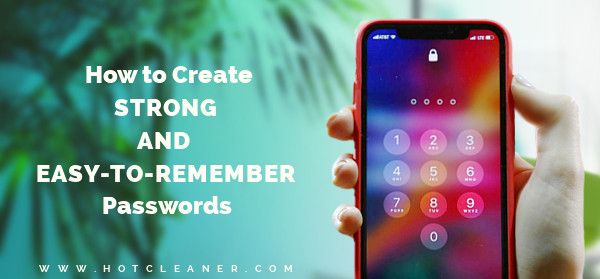By Click&Clean Updated: Friday, February 2, 2024.
When you log into services, online banking, computers, etc., you use a set of your credentials, usually consisting of a username and password.
A password is a secret word or combination of upper- and lowercase letters, numbers, and special characters to validate your identity to access account data that only you should know.

Nowadays, we use passwords for almost everything we do on the Internet. Password protection is used to secure your personal information, so the use of a strong, secure, and unique password is very important for maintaining the privacy and security of your data.
But many people often use the same simple, easy-to-guess passwords, such as the names of popular brands, movies, music, friends or pets, without knowing that they are putting their privacy and security at risk and that their accounts can be easily hacked.
Why does this happen? Because when we are creating passwords, we base them on things that we can easily remember. We don't think that hard-to-hack passwords should ideally be fairly long and contain multiple types of characters such as numbers, upper- and lowercase letters, and symbols.
In the table below, you can see examples of simple password patterns, that are converted into more secure and more difficult to crack.
| Password Pattern | Memorability | Security | Time To Crack |
|---|---|---|---|
| rachel | Very Easy | Weak | 1 second |
| R^@^c^h^3^l | Average | Strong | 4 hundred years |
| abc123 | Very Easy | Weak | 1 second |
| A#b#c#1#2#3 | Average | Strong | 4 hundred years |
| iloveyou | Very Easy | Weak | 1 second |
| i*l*o*v*e*y*o*u | Easy | Very Strong | 1 million years |
There are many random password generators on the Internet that can help you to collect a bunch of random characters to use as a strong and secure password, but the problem is that these passwords are very difficult to remember.
In this case, easy-to-remember nonsensical phrases can provide you with the best combination of security and memorability. Take a look at the example below.
| Password Pattern | Memorability | Security | Time To Crack |
|---|---|---|---|
| ixMhBc8jxDRlt#XD | Hard | Very Strong | 1 trillion years |
| imposing space strains included | Easy Enough | Very Strong | 1 decillion years |
Check out these security recommendations to keep your online accounts secure and prevent your passwords from being hacked:
1. Generate a unique password for every website you visit.
2. Create a strong password that has at least 12–20 characters and containis at least one number, one lowercase and one uppercase letter, and one special character, e.g. jxiuiaqsaqocmZ7#.
3. Do not share your passwords via email or text message, and don't forget to sign out of your accounts when you're done with everything.
4. Store your generated passwords in a simple text file and encrypt this file with a master password to the Zip or 7-Zip archive, or manage them using a password-manager utility.
5. Create a secure master password using an easy-to-remember nonsensical phrase that contains at least five words that are difficult to guess, e.g. designer take boards sole autonomy.
We really hope that these tips will help you prevent attacks and protect your personal information online.